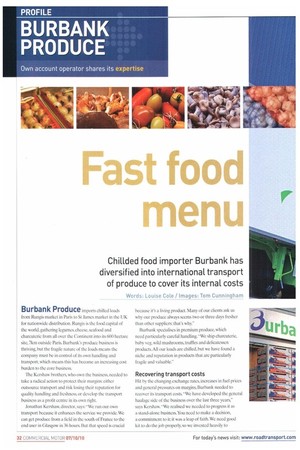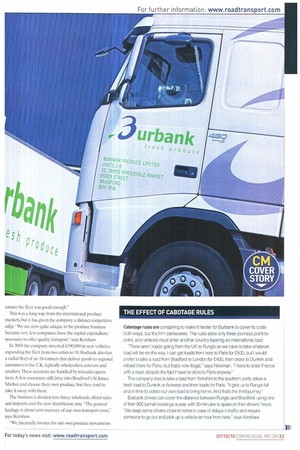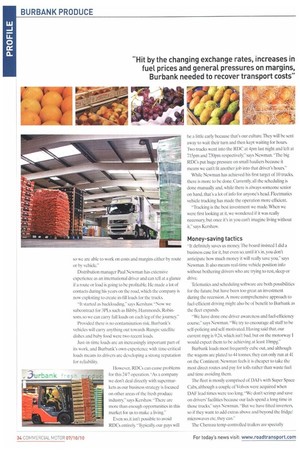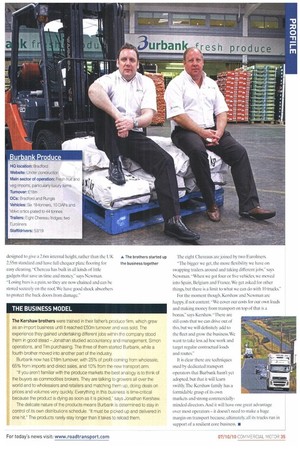Chillded food importer Burbank has diversified into international transport of produce to cover its internal. costs
Page 32

Page 33

Page 34

Page 35

If you've noticed an error in this article please click here to report it so we can fix it.
Words: Louise Cole / Images: Tom Cunningham
Burbank Produce imports chilled loads from Rungis market in Paris to Si James market in the UK for nationwide distribution. Rungis is the food capital of the world, gathering legumes, cheese, seafood and charcutcrie from all over the continent into its 600 hectare site, 7km outside Paris. Burbank's produce business is thriving, but the fragile nature of the loads means the company must be in control of its own handling and transport, which means this has become an increasing cost burden to the core business
The Kershaw brothers, who own the business, needed to take a radical action to protect their margins: either outsource transport and risk losing their reputation for quality handling and freshness, or develop the transport business as a profit centre in its own right.
Jonathan Kershaw, director, says:"We run our own transport because it enhances the service we provide. We can get produce from a field in the south of France to the end user in Glasgow in 36 hours. But that speed is crucial because it's a living product. Many of our clients ask us why our produce always seems two or three days fresher than other suppliers: that's why."
Burbank specialises in premium produce, which need particularly careful handling. "We ship chareuterie, baby veg, wild mushrooms, truffles and delicatessen products. All our loads are chilled, but we have found a niche and reputation in products that are particularly fragile and valuable."
Recovering transport costs
Hit by the changing exchange rates, increases in fuel prices and general pressures on margins. Burbank needed to recover its transport costs "We have developed the general haulage side of the business over the last three years," says Kershaw. "We realised we needed to progress it as a stand-alone business. You need to make a decision, a commitment to it: it was a leap of faith We need good kit to do the job properly, so we invested heavily to ensure the fleet was good enough."
This was a long way from the international produce markets, but it has given the company a distinct competitive edge. "We are now quite unique in the produce business because very few companies have the capital expenditure necessary to offer quality transport," says Kershaw.
In 2009 the company invested £190,000 in new vehicles, expanding the fleet from two artics to 10. Burbank also has a radial fleet of six 18-tonners that deliver goods to regional customers in the UK. typically wholesalers, caterers and retailers. These accounts are handled by telesales operatives. A few customers still drive into Bradford's St James Market and choose their own produce, but they tend to take it away with them.
The business is divided into three: wholesale; direct sales and imports; and the new distribution arm. "The general haulage is about cost recovery of our own transport costs,says Kershaw.
"We internally invoice for our own product movements so we are able to work on costs and margins either by route or by vehicle.
Distribution manager Paul Newman has extensive experience as an international driver and can tell at a glance if a route or load is going to be profitable. He made a lot of contacts during his years on the road, which the company is now exploiting to create in-fill loads for the trucks.
"It started as backloading," says Kershaw "Now we subcontract for 3PLs such as Bibby. Hammonds, Robinsons, so we can carry full loads on each leg of the journey" Provided there is no contamination risk. Burbank's vehicles will carry anything out towards RunRis: satellite dishes and baby food were two recent loads.
Just-in-time loads are an increasingly important part of its work, and Burbank's own experience with time-critical loads means its drivers are developing a strong reputation for reliability.
However, RDCs can cause problems for this 24/7 operation. "As a company we don't deal directly with supermarkets as our business strategy is focused on other areas of the fresh produce industry," says Kershaw. "There are more than enough opportunities in this market for us to make a living."
Even so, it isn't possible to avoid RDCs entirely. "Typically, our guys will be a little early because that's our culture. They will be sent away to wait their turn and then kept waiting for hours Two trucks went into the RDC at 4pm last night and left at 715pm and 730pm respectively" says Newman. "The big RDCs put huge pressure on small hauliers because it means we can't fit another job into that driver's hours." While Newman has achieved his first target of 10 trucks, there is more to be done. Currently all the scheduling is done manually and, while there is always someone senior on hand, that's a lot of info for anyone's head. Fleetmatics vehicle tracking has made the operation more efficient. "Tracking is the best investment we made. When we were first looking at it, we wondered if it was really necessary, but once it's in you can't imagine living without it," says Kershaw.
Money-saving tactics
it definitely saves us money The board insisted I did a business case for it, but even so, until it's in, you don't anticipate how much money it will really save you," says Newman. It also means real-time vehicle position info without bothering drivers who are trying to rest, sleep or drive.
Telematic.s and scheduling software are both possibilities for the future, but have been too great an investment during the recession. A more comprehensive approach to fuel-efficient driving might also be of benefit to Burbank as the fleet expands.
"We have done one driver awareness and fuel-efficiency course,says Newman. "We try to encourage all staff to be self-policing and self-motivated. Having said that, our current mpg is 9.24, which isn't bad, but on the motorway I would expect them to be achieving at least lOmpg."
Burbank loads most frequently cube out, and although the wagons are plated to 44 tonnes, they can only run at 41 on the Continent. Newman feels it is cheaper to take the most direct routes and pay for tolls rather than waste fuel and time avoiding them.
The fleet is mostly comprised of DAFs with Super Space Cabs, although a couple of Volvos were acquired when DAF lead times were too long. "We don't scrimp and save on drivers' facilities because our lads spend a long time in those trucks," says Newman. "But we have fitted inverters, so if they want to add extras above and beyond the fridge/ microwaves etc, they can.
The Chereau temp-controlled trailers are specially
designed to give a 2.6m internal height, rather than the UK 2.55m standard and have full chequer plate flooring for easy cleaning."Chereau has built in all kinds of little gadgets that save us time and money," says Newman. "Losing bars is a pain, so they are now chained and can he stored securely on the roof. We have good shock absorbers to protect the back doors from damage." The eight Chereaus are joined by two Euroliners.
"The bigger we get, the more flexibility we have on swapping trailers around and taking different jobs," says Newman. "When we got four or five vehicles, we moved into Spain. Belgium and France. We get asked for other things, but there is a limit to what we can do with 10 trucks.'
For the moment though, Kershaw and Newman are happy, if not content. "We cover our costs for our own loads and making money from transport on top of that is a bonus," says Kershaw"There are still costs that we can drive out of this, but we will definitely add to the fleet and grow the business. We want to take less ad hoc work and target regular contractual loads and routes."
It is clear there are techniques used by dedicated transport operators that Burbank hasn't yet adopted, but that it will learn swiftly. The Kershaw family has a formidable grasp of its own markets and strong commerciallyminded directors. And it will have one great advantage over most operators — it doesn't need to make a huge margin on transport because, ultimately, all its trucks run in support of a resilient core business. •




























































































































